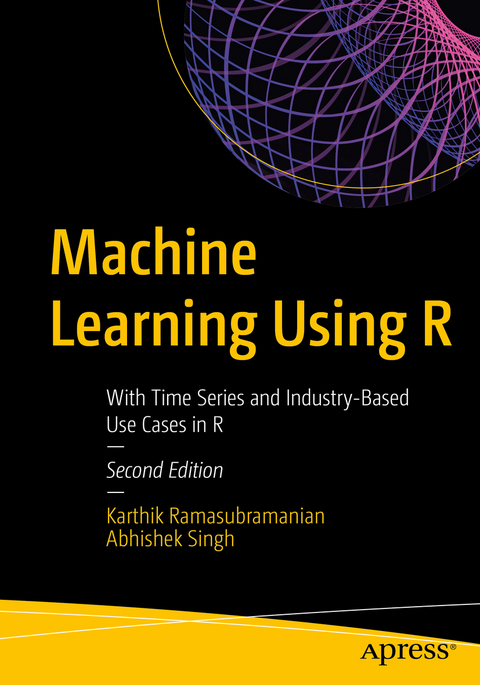
Machine Learning Using R
Apress (Verlag)
978-1-4842-4214-8 (ISBN)
As in the first edition, the authors have kept the fine balance of theory and application of machine learning through various real-world use-cases which gives you a comprehensive collection of topics in machine learning. New chapters in this edition cover time series models and deep learning.
What You'll Learn
Understand machine learning algorithms using R
Master the process of building machine-learning models
Cover the theoretical foundations of machine-learning algorithms
See industry focused real-world use cases
Tackle time series modeling in R
Apply deep learning using Keras and TensorFlow in R
Who This Book is For
Data scientists, data science professionals, and researchers in academia who want to understand the nuances of machine-learning approaches/algorithms in practice using R.
Karthik Ramasubramanian has over seven years’ experience leading data science and business analytics in retail, FMCG, e-commerce, information technology and hospitality for multi-national companies and unicorn startups. A researcher and problem solver with a diverse set of experience in the data science life cycle, starting from a data problem discovery to creating data science PoCs and products for various industry use cases. In his leadership roles, he has been instrumental in solving many ROI-driven business problems through data science solutions. He has mentored and trained hundreds of professionals and students around the world through various online platforms and university engagement programs in data science. He has designed, developed and spearheaded many A/B experiment frameworks for improving product features, conceptualized funnel analysis for understanding user interactions and identifying the friction points within a product, and designed statistically robust metrics. On the predictive side, he has developed intelligent chatbots based on deep learning models which understands human-like interactions, customer segmentation models, recommendation systems and many natural language processing models. His current areas of interest include ROI-driven data product development, advanced machine learning algorithms, data product frameworks, Internet of Things (IoT), scalable data platforms, and model deployment frameworks. Karthik completed his M.Sc. (Theoretical Computer Science) from PSG College of Technology, Coimbatore (Affiliated to Anna University, Chennai), where he pioneered the application of machine learning, data mining and fuzzy logic in his research work on computer and network security. Abhishek Singh is on a mission to profess the de facto language of this millennium, the numbers. He is on a journey to bring machine closer to human, for a better and beautiful world around us by generating opportunities with artificial intelligence and machine learning. He leads team of data science professionals who are solving pressing problems in food security, cyber security, natural disaster, healthcare and many more areas, all with help of data and technology. Abhishek is in the process of bringing smart IoT devices to smaller cities in India for people to leverage technology to improve their lives. He has worked with colleagues from many parts of the USA, Europe and Asia, and strives to work with more people from various backgrounds. In a span of six years at big corporates, he has stress tested the assets of US banks, solved insurance pricing models, and made the telecom experience easier for customers, and is now creating data science opportunities with his team of young minds. He actively participates in analytics-related thought leadership, writing, public speaking, meet-ups and training in data science. He is staunch supporter of responsible use of AI toremove biases and fair use for a better society. Abhishek completed his MBA from IIM Bangalore, B.Tech. (Mathematics and Computing) from IIT Guwahati, and PG Diploma (Cyber Law) from NALSAR University, Hyderabad.
Chapter 1: Introduction to Machine Learning.- Chapter 2: Data Exploration and Preparation.- Chapter 3: Sampling and Resampling Techniques.- Chapter 4: Visualization of Data.- Chapter 5: Feature Engineering.- Chapter 6: Machine Learning Models: Theory and Practice.- Chapter 7: Machine Learning Model Evaluation.- Chapter 8: Model Performance Improvement.- Chapter 9: Time Series Modelling.- Chapter 10: Scalable Machine Learning and related technology.- Chapter 11: Introduction to Deep Learning Models using Keras and TensorFlow.
“The wide variety of concepts and the unique blend of theory and exercises recommend this book as a reliable starting point for researchers looking for a deeper understanding of machine learning approaches … . The book is suitable for a wide variety of backgrounds and skill sets, it is addressed to researchers from undergraduates to postgraduates and established researchers and from a wide range of interdisciplinary backgrounds such as computer science, mathematics, physics and biology.” (Irina Ioana Mohorianu, zbMATH 1423.68007, 2019)
| Erscheinungsdatum | 14.01.2019 |
|---|---|
| Zusatzinfo | 24 Illustrations, color; 209 Illustrations, black and white; XXIV, 700 p. 233 illus., 24 illus. in color. |
| Verlagsort | Berkley |
| Sprache | englisch |
| Maße | 178 x 254 mm |
| Themenwelt | Mathematik / Informatik ► Informatik ► Programmiersprachen / -werkzeuge |
| Mathematik / Informatik ► Informatik ► Software Entwicklung | |
| Informatik ► Theorie / Studium ► Compilerbau | |
| Informatik ► Theorie / Studium ► Künstliche Intelligenz / Robotik | |
| Schlagworte | Data Exploration • Data Visualization • feature engineering • machine learning • Machine Learning Models • R Programming • Sampling Techniques • scalable machine learning • source code |
| ISBN-10 | 1-4842-4214-9 / 1484242149 |
| ISBN-13 | 978-1-4842-4214-8 / 9781484242148 |
| Zustand | Neuware |
| Haben Sie eine Frage zum Produkt? |
aus dem Bereich


